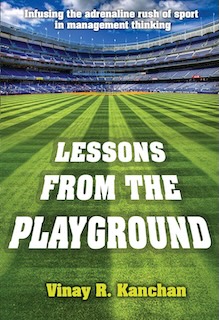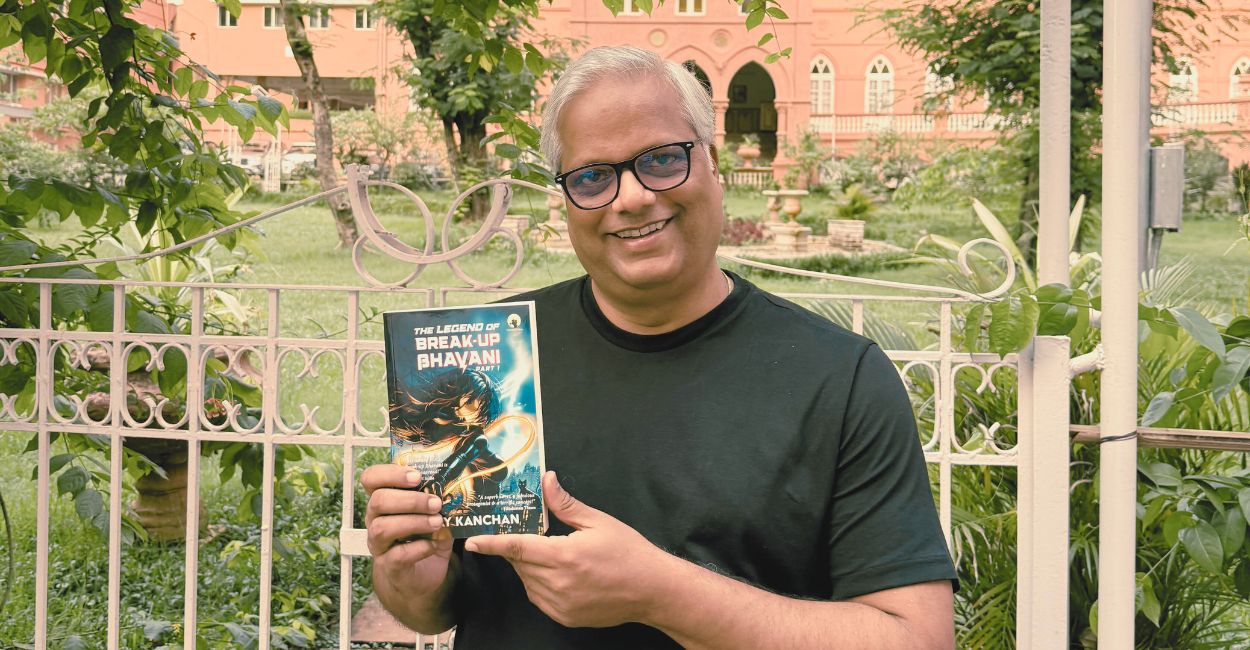Vinay Kanchan is not just a bestselling author—he’s a brand storyteller, innovation catalyst, and one of India’s most original voices on creative thinking. An electronics engineering graduate from Mumbai University with an MBA in marketing, Vinay spent over a decade in advertising, rising through leadership roles at top agencies before pivoting into a more independent, idea-fuelled path.
Today, he wears many hats: creative thinking trainer, brand ideation consultant, and author. His workshops—from the inventive Cracking The Da Vinci Code to the refreshingly unconventional The Tao of Client Service—have sparked fresh thinking across some of India’s most respected organisations.

A thoughtful writer beyond books, he has contributed to publications like The Hindu Business Line, DNA, Financial Express, Campaign India, and YourStory, and was part of the elite blogging panel at afaqs.com.
Vinay’s literary journey began when he won a nationwide blogging contest, leading to his debut book, The Madness Starts at 9—a sharp, humorous take on office life that struck a chord with corporate India. The Hindu Business Line called it “a light-hearted and surprisingly insightful read.”
His second book, Lessons from the Playground, blends childhood games with leadership and management wisdom—a fresh, relatable take now available on Amazon. In conversations with Paris Post, he has shared tips on how to overcome writer's block, the best habits, and when he finds his best time to write. Let's dive in.
In Conversation with Author Vinay Kanchan
1. This is your fourth book—what inspired you to write in this particular genre?
Fiction has always been close to my heart. Also, in many ways, this is a new genre I was looking to create—one which combined the richness of Indian mythology with the vibrant world of superheroes. So, as a creative thinking person, creating an 'out-of-the-box' disruption was something I could not resist.
2. Did you always dream of becoming an author, or was it a gradual journey?
I have always been a storyteller. I wrote my first story when I was in 3rd grade. I also helped pen an original sci-fi play which was performed at a school’s Teachers’ Day function. Early on, it was not an active ambition—just something that came to me naturally. It was only when my work got selected as the winner of a nationwide blogging contest in 2008—leading to the birth of The Madness Starts at 9—that I consciously felt the desire to pen more and more books.
3. What was your biggest takeaway from your book The Madness at 9?
At one level, it was encouraging to see that my writing style had the potential to develop a following. At another, it was also interesting to note how The Madness..., which was a satire on corporate life, led many people to write to me, sharing their own experiences in the same vein. It kindled a desire to find the funny in the frustrating among its readers. This showed me, at a very personal and real level, the power of a book to start conversations. It was also an exhibition of the power of humour to alleviate serious problems.
4. You made a sudden jump from corporate life to Lessons from the Playground. What led to that shift?
Sport has always been a part of my life. Though I played only football, cricket, and hockey actively, I was interested in many other sports as well. It served as a source of inspiration. I often looked to the sporting metaphor to better construct my arguments in the business world too—which almost made the writing of Lessons from the Playground as inevitable as a Bumrah yorker in the slog overs.
5. Is there any real-life inspiration behind your writing? Any moment or person that made you write on that topic?
There is always something from one’s own life which inspires creativity. This is certainly true for me, as I suspect it is for other creative people. Observations from office life provoked The Madness Starts at 9, albeit with a lot of creative exaggerations. Sporting events, heroes, and milestones demanded both Lessons from the Playground and Sportivity. Mentoring people and counselling conversations opened the doors for The Legend of Break-up Bhavani.
6. Sportivity was an airport read. What makes it different from Lessons from the Playground?
Lessons from the Playground was a sort of tome in management thinking. It was comprehensive and exhaustive—meant to be written in the style of a reference book, albeit never boring or pedantic. This was acknowledged in the fact that it has been stocked in many management college libraries, both in India and abroad. Sportivity was penned with a little more levity and playfulness. It was a much shorter read and used fun devices like poetic verse and reader exercises to try and make thinking the new sport. In that manner, they were distinctly different and unique in their own characters.
7. The Legend of Break-up Bhavani has a superhero-comic vibe. Could you tell us the inspiration behind exploring that genre?
I have been a comic book fan all through. Growing up, I found the world of superheroes fascinating. However, I saw a lack of any true Indian superhero. Not that attempts had not been made—but most of them borrowed too much from foreign tropes to really resonate with Indian sensibilities. So, “What would make this character truly Indian?” was one question I began this process with. I also wanted to create a character who would resonate with the lives and issues of younger folk. Those kinds of ideas led to the creation of Break-up Bhavani.
8. You seem to explore multiple genres—what motivates you to experiment across different writing styles?
I think it is good to be intellectually flexible. Delving into different genres, themes, and ideas helps one’s writing and thinking stay fresh. The temptation is always to invest in one—something that works well for many people, to be fair. But for me, as a student of creative thinking, the challenge of trying something new and different is always an invigorating one.
9. As a writer and a comic/superhero book lover, how do you merge humour, emotion, and action in your narratives?
Every writing style is a reflection of the author’s personality. I have always found it easy to infuse humour into whatever it is I’m doing—it’s almost a reflex action. Merging different things together is the very lifeblood of creative thinking. So, using humour as a base, I merged corporate life with it for my first book, sporting inspiration for my second and third, and young love and friendships layered with a superheroic universe for my fourth.
10. You’re also a corporate trainer—how did you choose this field, and why?
I have loved working with people, guiding them, helping them improve in whatever way I can. I did that even as a leader in the corporate world. The progression to training seemed very natural. I believe that the quality of one’s life improves as the quality of their ideation goes up. Hence, the foray into training people to think ‘out of the box’, and come up with more effective solutions to the challenges they face.
11. What is Decoding the Vinci Code all about? Why do you think it’s relevant for today’s young generation?
The title of the program is Cracking the Da Vinci Code. It began with the premise that many people believe they are not creative. Yet, just reflecting back on one’s own childhood memories often proves they once were. This session reinfuses a creative confidence in people. It helps them appreciate that the art of thinking differently is inherent in all of us. As I said before, one’s success is largely down to their ability to think through challenges—and this program helps at that level.
12. What are your hobbies apart from writing?
I love playing football when I can. I used football as a platform to bring people together. This led to the creation of Juhu Beach United, an informal footballing group which loosely inspired the critically acclaimed Bollywood movie Tu Hai Mera Sunday. Apart from that, I love reading eclectically, watching sports, and movies.
13. How do you balance writing books while managing your role as a corporate trainer?
One helps the other in many ways. Both are about being intellectually engaged. It helps to always set aside time for writing on a regular basis. In fact, my writing—including various articles featured on leading media platforms—often helps me land assignments. So, in a sense, they are perfectly synergistic.
14. What are the things that keep you going creatively—even on difficult days?
An ability to find something to laugh about is a sure-fire fuel not only for creativity but also for deeper spiritual development. Poetically put, “I lean on the smile to take me through the difficult while.” 🙂
15. Do you follow a specific routine or ritual while working on your books?
Depends on whether there is a deadline involved. But usually, it comes down to sitting in front of the computer and developing the discipline to write—even when inspiration is proving to be elusive. That rigour goes a long way!












